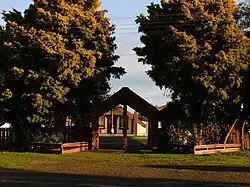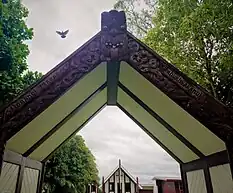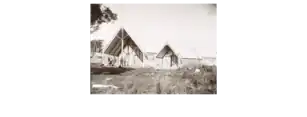| Ngāti Kauwhata | |
|---|---|
| Iwi (tribe) in Māoridom | |
| Rohe (region) | Manawatū-Whanganui |
| Waka (canoe) | Tainui |
| Population | 1,734 (and/or more) |
Ngāti Kauwhata is a Māori iwi (tribe) located in the Manawatū-Whanganui region of New Zealand. The iwi has ancestral ties to Tainui Waka and Maungatautari. The iwi has two main marae, Kauwhata Marae (Kai Iwi Pā) [1] & Aorangi Marae.[2]
In the 2018 New Zealand census,[3] 1,734 people listed Ngāti Kauwhata as their iwi.
Kauwhata Marae (Kai Iwi Pā)

Kauwhata (Kai Iwi Pā) is located just south of Feilding. The main hapū of the marae is Ngāti Hinepare.
The whare-tīpuna is also named Kauwhata with the wharemoe named Te Aroha o Ngā Mokopuna and the wharekai named Moarikura.
Pepeha
Ko Ruahine te Maunga
Ko О̄roua raua ko Rangitīkei ngā Awa.
Ko Tainui te Waka.
Ko Hinepare te Hapū
Ko Ngāti Kauwhata te Iwi.
Aorangi Marae

Aorangi marae is located just south of Feilding. The main hapū is Ngāti Tahuriwakanui.
The wharenui is named Maniaihu.
Pepeha
Ko Ruahine te Maunga
Ko Rangitīkei te Awa
Ko Tainui te Waka
Ko Tahuriwakanui te Hapū
Ko Ngāti Kauwhata te Iwi
Te Iwa Tekau mā Iwa
Te Iwa tekau mā Iwa was a marae located in Awahuri on the east bank of the О̄roua River, a few chains south of the main highway between Palmerston North and Bulls.[4] The wharenui of the marae was simply known as "Te Iwa".

The marae was erected by the Ngāti Kauwhata hapū Ngāti Turoa in the early 1880s for the visit of Kiingi Tāwhiao on the 25th Of January 1883.[5] The wharenui fell into disrepair in the early 20th century, and was destroyed by the 1936 New Zealand Cyclone. [6][4]
Pepeha
Ko Ruahine te Maunga
Ko О̄roua te Awa
Ko Tainui te Waka
Ko Turoa te Hapū
Ko Ngāti Kauwhata te Iwi
References
- ↑ "Kauwhata (Kai Iwi Pā) | Maori Maps". maorimaps.com. Retrieved 13 December 2023.
- ↑ "Aorangi | Maori Maps". maorimaps.com. Retrieved 13 December 2023.
- ↑ "nzdotstat.stats.govt.nz".
- 1 2 "Meeting house at Awahuri". manawatuheritage.pncc.govt.nz. Retrieved 14 December 2023.
- ↑ "paperspast.natlib.govt.nz". paperspast.natlib.govt.nz. Retrieved 14 December 2023.
- ↑ "Te Iwi Tekau Marae, c. 1880's". www.feildingheritage.nz. Retrieved 14 December 2023.